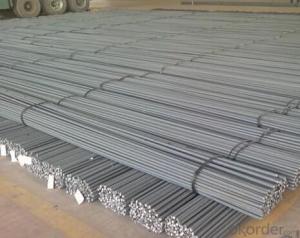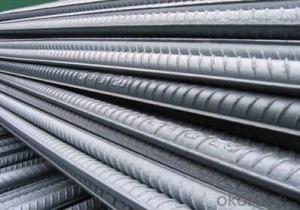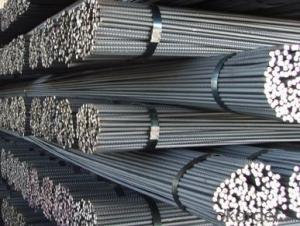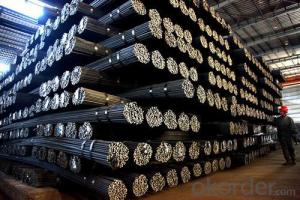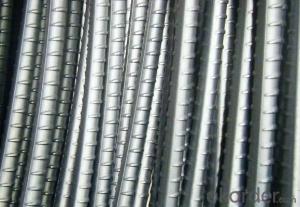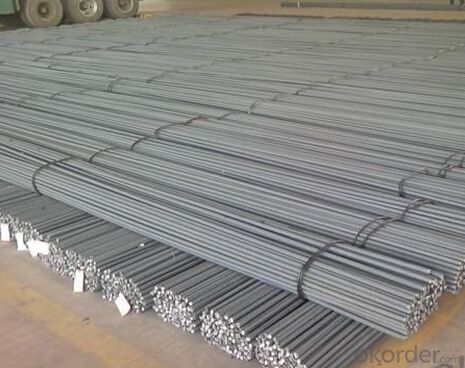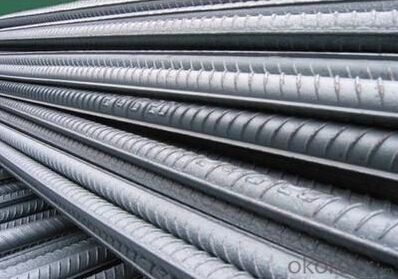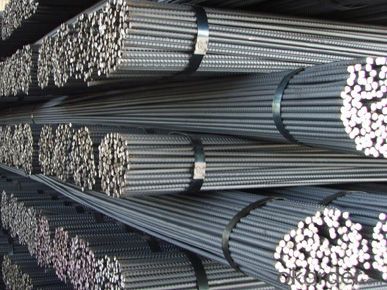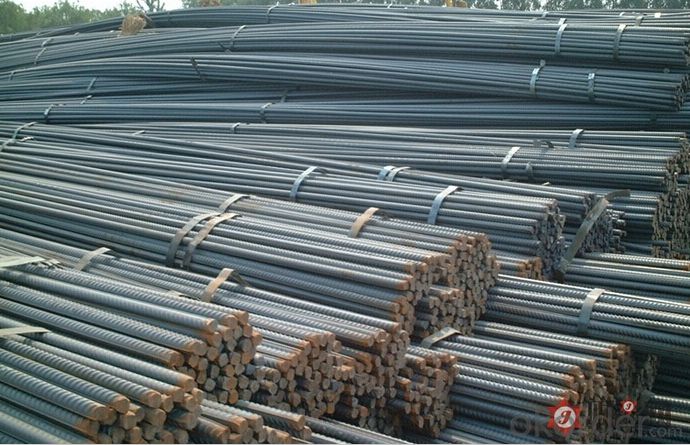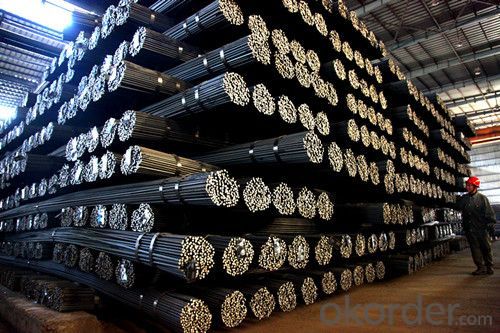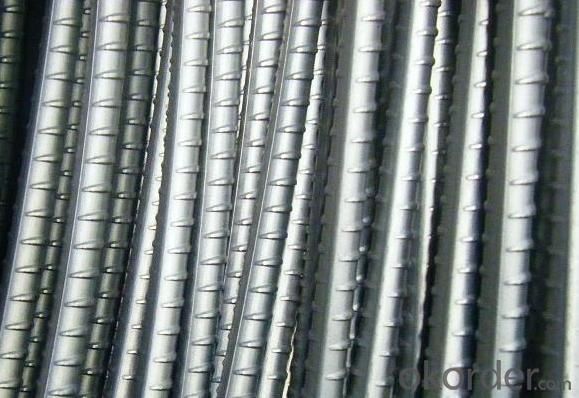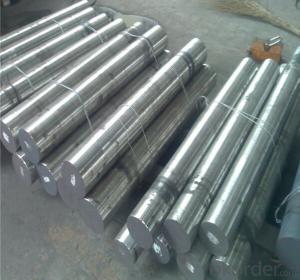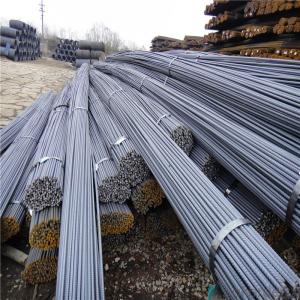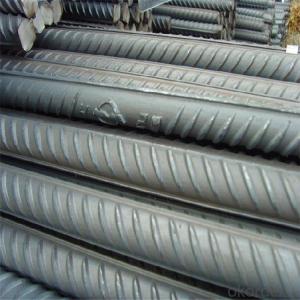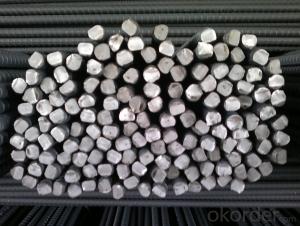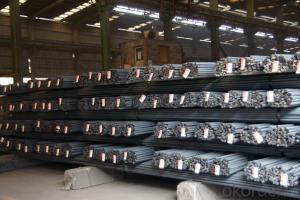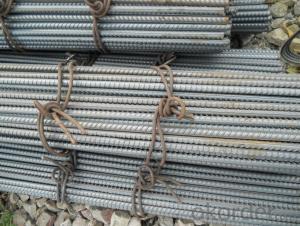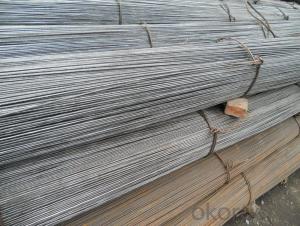High Tensile Deformed Bar Grade E40_E60_E75
- Loading Port:
- Tianjin
- Payment Terms:
- TT OR LC
- Min Order Qty:
- 50 m.t.
- Supply Capability:
- 10000 m.t./month
OKorder Service Pledge
OKorder Financial Service
You Might Also Like
Specification
High Tensile Deformed Bar Grade E40_E60_E75
Details of High Tensile Deformed Bar Grade E40_E60_E75
Name | Deformed Bar |
Shape | Round Bar |
Standard | 1.GB1499.2-2007, HRB335, HRB400E 2. ASTM A615 Gr.40, Gr.60 3.BS4449/1997 |
Diameter | 6mm-50mm |
Length | 6m, 8m, 9m,12m as standard or as request |
Test | SGS/UT 100% Elements Testing |
Certificate: | ISO/Mill Certificate |
Service: | 24 hours online service / |
more than 20 years trading and manufacture | |
Quality Assurance: | the third party inspection, such as SGS, BV, TUV…etc. is acceptable |
Packaging Details: | Seaworthy Packaging or as per customer's packing instruction |
Specification of High Tensile Deformed Bar Grade E40_E60_E75
Standard | Grade | Yield Strength Mpa | Tensile Strength | Elongation% |
BS4449:1997 | 250 | 250 | 295 | 22 |
460A | 460 | 485 | 12 | |
460B | 460 | 500 | 15 | |
GB1499.2-2007 | HRB335/335E | 335 | 455 | 17 |
HRB400/400E | 400 | 540 | 17 | |
HRB500/500E | 500 | 630 | 16 | |
ASTM A615 & A615M-04a | GRADE40 | 280 | 420 | 12 |
GRADE60 | 420 | 620 | 9 | |
GRADE75 | 520 | 690 | 7 | |
JIS G3112-2004 | SD295A | ≥ 295 | 440-600 | 17 |
SD295B | 295-390 | ≥ 440 | 17 | |
SD345 | 345-440 | ≥490 | 19 | |
SD390 | 390-510 | 560 | 17 | |
SD490 | 490-625 | ≥ 620 | 13 |
Size | WEIGHT | WEIGHT | QUANTITY | ||
LENGTH 6M | LENGTH 12M | LENGTH 6M | LENGTH 12M | ||
6 | 0.222 | 1.332 | 2.664 | 751 | 375 |
8 | 0.395 | 2.37 | 4.74 | 422 | 211 |
10 | 0.617 | 3.702 | 7.404 | 270 | 135 |
12 | 0.888 | 5.328 | 10.656 | 188 | 94 |
14 | 1.21 | 7.26 | 14.52 | 138 | 69 |
16 | 1.58 | 9.48 | 18.96 | 106 | 53 |
18 | 2 | 12 | 24 | 83 | 42 |
20 | 2.47 | 14.82 | 29.64 | 67 | 34 |
22 | 2.98 | 17.88 | 35.76 | 56 | 28 |
25 | 3.85 | 23.1 | 46.2 | 43 | 22 |
28 | 4.83 | 28.98 | 57.96 | 35 | 17 |
32 | 6.31 | 37.86 | 75.72 | 26 | 13 |
36 | 7.99 | 47.94 | 95.88 | 21 | 10 |
40 | 9.87 | 59.22 | 118.44 | 17 | 8 |
50 | 15.42 | 92.52 | 185.04 | 11 | 5 |
CNBM Introduction of High Tensile Deformed Bar Grade E40_E60_E75 Supplier
CNBM International Corporation is the most import and export platform of CNBM group(China National Building Material Group Corporation) ,which is a state-owned enterprise, ranked in 270th of Fortune Global 500 in 2015.
With its advantages, CNBM International are mainly concentrate on Cement, Glass, Iron and Steel, Ceramics industries and devotes herself for supplying high quality series of refractories as well as technical consultancies and logistics solution.
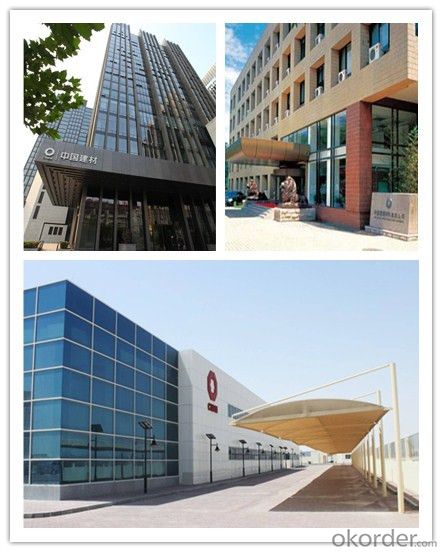
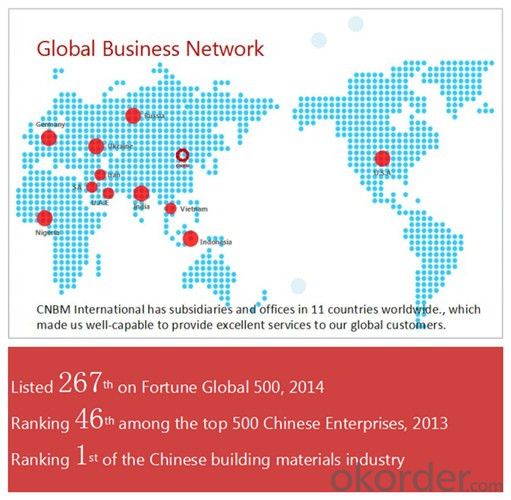
Packaging & Delivery of High Tensile Deformed Bar Grade E40_E60_E75
Packaging Detail | Sea worthy packing /as per customer's packing instruction |
Delivery Detail | 15 ~ 40 days after receiving the deposit |
Products Show
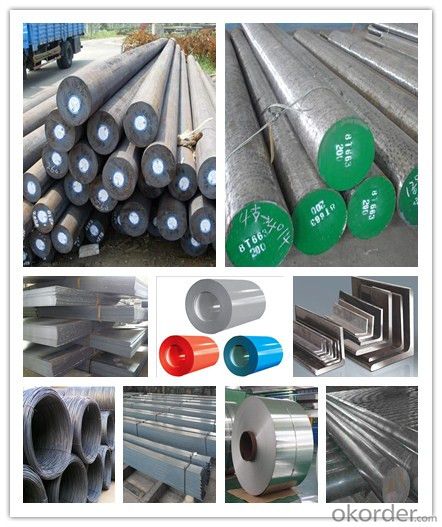
FAQ:
Are you a trading company or manufacturer? | Manufacturer |
What’s the MOQ? | 3 metric ton |
What’s your delivery time? | 15-35 days after downpayment received |
Do you Accept OEM service? | Yes |
what’s your delivery terms? | FOB/CFR/CIF |
What's the Payment Terms? | 30% as deposit,70% before shipment by T/T |
Western Union acceptable for small amount. | |
L/C acceptable for large amount. | |
Scrow ,Paybal,Alipay are also ok | |
Why choose us? | Chose happens because of quality, then price, We can give you both. Additionally, we can also offer professional products inquiry, products knowledge train (for agents), smooth goods delivery, excellent customer solution proposals. |
What's your available port of Shipment? | Main Port, China |
What’s your featured services? | Our service formula: good quality+ good price+ good service=customer's trust
|
Where are your Market? | Covering more than 160 countries in the world |
- Q: How does special steel contribute to the automotive emission reduction?
- Special steel contributes to automotive emission reduction in several ways. Firstly, it is used in the production of lightweight components, such as body panels and chassis parts. By replacing heavier materials with special steel, vehicles become lighter, resulting in improved fuel efficiency and reduced emissions. Additionally, special steel offers superior strength and durability, allowing for the design of more efficient and compact engines. This enables automakers to reduce engine size while maintaining performance, leading to reduced fuel consumption and lower emissions. Furthermore, special steel is used in the manufacturing of exhaust systems, catalytic converters, and other emission control devices. Its high heat resistance and corrosion resistance properties ensure the effective functioning of these components, thereby minimizing harmful pollutants released into the atmosphere. Overall, special steel plays a crucial role in automotive emission reduction by enabling lighter and more efficient vehicles, enhancing engine performance, and ensuring the effectiveness of emission control systems.
- Q: How is case-hardening steel used in the production of gears and camshafts?
- Case-hardening steel is used in the production of gears and camshafts to enhance their surface hardness and durability. The process involves heating the steel to a specific temperature and then rapidly cooling it, creating a hard outer layer while maintaining a tough and ductile core. This hardened surface allows gears and camshafts to withstand the high levels of stress, friction, and wear they experience during operation, resulting in improved performance, longevity, and reliability.
- Q: How does special steel perform in high-pressure applications?
- Special steel performs exceptionally well in high-pressure applications. This type of steel is specifically designed to withstand extreme pressure conditions, making it an ideal choice for industries that require reliable and durable materials for their operations. One of the key characteristics of special steel is its high tensile strength, which allows it to handle immense pressure without deformation or failure. This strength is achieved through alloying elements and heat treatment processes that enhance the steel's structural integrity. As a result, special steel can withstand the intense forces exerted on it in high-pressure environments, ensuring the safety and efficiency of the equipment or structures it is used in. Furthermore, special steel exhibits excellent resistance to corrosion and oxidation, further enhancing its suitability for high-pressure applications. This resistance helps maintain the structural integrity of the steel, preventing any weakening or degradation that could compromise its performance under pressure. Additionally, special steel's resistance to corrosion ensures that it can withstand harsh environments, such as those found in oil and gas extraction, chemical processing, or power generation industries. Another advantage of special steel in high-pressure applications is its ability to retain its mechanical properties even at elevated temperatures. This property is crucial in industries where high temperatures are involved, such as aerospace, nuclear power, or steam generation. The steel's high-temperature strength and stability enable it to withstand the combination of high pressure and elevated temperatures, ensuring reliable performance and long-term durability. In summary, special steel is an excellent choice for high-pressure applications due to its high tensile strength, resistance to corrosion and oxidation, as well as its ability to maintain its mechanical properties at elevated temperatures. Its exceptional performance in these demanding conditions makes it a reliable and durable material for industries that operate under high-pressure environments.
- Q: What are the future trends in special steel manufacturing?
- Some of the future trends in special steel manufacturing include advancements in technology and automation, increased focus on sustainability and environmental impact, development of new alloys and materials with enhanced properties, and growing demand for specialized steels in industries like aerospace, automotive, and renewable energy. Additionally, there is a shift towards customization and tailored solutions to meet specific customer requirements, as well as an emphasis on research and development to drive innovation in the field.
- Q: What are the different high-temperature grades of special steel?
- There exists a variety of special steel grades that can withstand extreme heat and provide enhanced mechanical properties. Some of the frequently utilized high-temperature grades are as follows: 1. Stainless steel 310: Renowned for its exceptional resistance to oxidation at high temperatures, this grade boasts a high chromium and nickel content, resulting in excellent corrosion resistance and elevated temperature strength. 2. Inconel 625: Inconel alloys, which are nickel-based superalloys, exhibit remarkable resistance to oxidation and corrosion. In particular, Inconel 625 offers outstanding strength and toughness at high temperatures, rendering it suitable for applications in aerospace and chemical processing industries. 3. Hastelloy X: A notable example is Hastelloy X, a nickel-chromium-iron-molybdenum alloy that showcases extraordinary strength and oxidation resistance at elevated temperatures. It finds widespread use in gas turbine engines, industrial furnace components, and other high-temperature applications. 4. Alloy 800H: This specific grade of special steel is an austenitic alloy that possesses high resistance to oxidation, carburization, and nitridation. It frequently finds application in heat exchangers, furnace components, and petrochemical industries. 5. Titanium Grade 5: While technically not steel, titanium grade 5 is a high-temperature alloy that delivers exceptional strength and corrosion resistance at elevated temperatures. It is commonly employed in aircraft engine components, chemical processing equipment, and marine applications. These examples merely represent a fraction of the high-temperature grades of special steel available in the market. Each grade serves a specific purpose, excelling in various applications that demand extreme heat resistance and specific mechanical properties.
- Q: What are the main applications of special steel in the semiconductor industry?
- Special steel is widely used in the semiconductor industry for various applications. One of the main applications is in the production of wafer fabrication equipment, such as vacuum chambers, deposition tools, and etching systems. The high strength, corrosion resistance, and thermal stability of special steel make it suitable for these critical components that operate under extreme conditions. Additionally, it is also used in the manufacturing of precision molds and dies required for semiconductor packaging processes. Overall, special steel plays a vital role in ensuring the reliability, performance, and quality of semiconductor manufacturing processes.
- Q: How does special steel contribute to the fatigue resistance of products?
- The exceptional fatigue resistance of products is attributed to the unique properties and manufacturing processes of special steel. Firstly, special steel is engineered and designed to possess enhanced strength and durability, resulting in high resistance against fatigue. This is achieved by incorporating alloying elements such as chromium, nickel, molybdenum, and vanadium, which enhance the material's ability to withstand cyclic loading and stress. Furthermore, rigorous heat treatment processes, including quenching and tempering, are employed to further improve the fatigue resistance of special steel. These processes refine the microstructure of the material, leading to a more uniform and fine-grained product. Consequently, the steel's ability to resist crack initiation and propagation, which are critical factors in fatigue failure, is significantly enhanced. Moreover, specialized surface treatments like shot peening or nitriding are often applied to special steel. These treatments introduce compressive residual stresses on the material's surface, acting as a barrier against crack formation and growth. This significantly boosts the fatigue resistance of the product. Additionally, special steel can be manufactured with specific grain orientations using directional solidification techniques. This allows for the alignment of grains along the primary loading direction, reducing the likelihood of crack initiation at grain boundaries and further improving the material's fatigue performance. In conclusion, the exceptional fatigue resistance of special steel is a result of its unique properties and manufacturing processes. The combination of enhanced strength, refined microstructure, specialized surface treatments, and tailored grain orientations make special steel the preferred choice in industries where fatigue failure is a concern. This ensures prolonged lifespan and reliability of products.
- Q: How is maraging steel used in the production of rocket and missile components?
- Maraging steel is used in the production of rocket and missile components due to its exceptional strength, toughness, and resistance to heat and corrosion. Its unique properties make it ideal for critical parts like rocket casings, engine components, and missile guidance systems, where high performance and reliability are paramount. The steel's ability to handle extreme conditions, such as high pressures and temperatures, ensures that these components can withstand the rigorous demands of aerospace applications.
- Q: What are the properties of high-strength alloy steel?
- High-strength alloy steel possesses a combination of outstanding mechanical properties such as high tensile strength, good toughness, excellent wear resistance, and superior corrosion resistance. This type of steel is known for its ability to withstand heavy loads, extreme temperatures, and harsh environments, making it suitable for applications in industries like aerospace, automotive, and construction.
- Q: What are the potential health hazards associated with working with special steel?
- The potential health hazards associated with working with special steel include exposure to toxic fumes and dust, which can lead to respiratory problems such as asthma or lung damage. Skin contact with certain types of special steel may cause irritation or allergic reactions. Additionally, the physical nature of the work, such as heavy lifting or repetitive motions, can contribute to musculoskeletal disorders and injuries. Proper safety measures, such as wearing appropriate protective equipment and ensuring proper ventilation, are crucial in minimizing these health risks.
Send your message to us
High Tensile Deformed Bar Grade E40_E60_E75
- Loading Port:
- Tianjin
- Payment Terms:
- TT OR LC
- Min Order Qty:
- 50 m.t.
- Supply Capability:
- 10000 m.t./month
OKorder Service Pledge
OKorder Financial Service
Similar products
Hot products
Hot Searches
Related keywords
